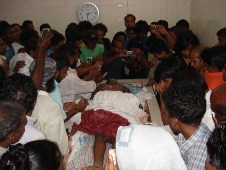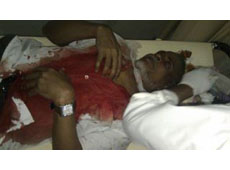J Hotel & Resorts owner MP Abdulla Jabir has responded to no payment allegations made by Aldihoo Resort staff, declaring “If they do not like it, they can leave”.
Staff at the resort revealed how both Maldivian and foreign workers had not received pay for four months and six months respectively, despite complaints made to management and various external government organisations.
Alidhoo Resort in Haa Alif Atoll is run by J Hotel & Resorts, a company owned by Maldivian Democratic Party (MDP) MP Abdullah Jabir, the husband of former Human Rights Minister Dhiyana Saeed.
Five Alidhoo Resort workers living in the near-by island of Dhidhdhoo spoke to Minivan News – under condition of anonymity – of their frustration as management continues to withhold their pay.
The five workers claim that the Human Rights Commission of Maldives (HRCM) has “forgotten” about them, despite multiple complaints made to the institution.
“We [staff] complain every other week to the HRCM, but never receive any response. We contacted the Labour Ministry and they told us they would reply in November, but they still haven’t got back to us.
“Our verbal complaints never get us anywhere with management, usually they say ‘we can’t pay you right now”’even though the resort’s been at 100 percent occupancy the last few months,” alleged the staff.
Earlier this year the Tourism Employees’ Association of the Maldives (TEAM) released information revealing that Alidhoo’s management had not paid the resort’s 125 expatriate staff for six months, while the 85 local employees had not been paid since May.
“I am struggling more than the staff”: MP Abdulla Jabir
Responding to the no payment allegations, J Hotel & Resorts Chairman Abdulla Jabir explained that there was a delay in payment because of a “delay in making money”.
Jabir claimed that there had been less than 30 percent occupancy in the last year, despite staff claiming it being at 100 percent for the last two months.
“We have 250 staff [at Alidhoo Resort] and rather than go on leave and then come back during times of low occupancy they are telling us they want to stay.
“[The staff] are not struggling, that’s wrong. If they are struggling, they will not stay. They are staying and that means they are not struggling.
“I am struggling more than them,” he added.
Staff have gone on strike on three previous occasions over the salary issue, but have been met with harsh penalties including the dismissal of those staff involved in the strikes.
Sources from within the resort claim they face losing their jobs if they make a formal complaint to management and are therefore “trapped” over the payment issue.
Despite Jabir’s company owning Alidhoo Resort, the MDP MP distanced himself from allegations made by the workers claiming that he “is not involved in this” and that the media need to contact the people responsible for the matter, adding: “You don’t contact [Silvio] Berlusconi for every matter in Italy, you contact the respective ministers.”
“If I close the resort they don’t get pay, they don’t get food, they don’t get accommodation and they will be jobless.
“Maybe they get 10 days, 15 days delay in salary, or even a month’s delay in salary, but they are making it. It is not an issue,” Jabir told Minivan News.
“The staff can go home if they feel like not working for us.”
A mother from Baarah, Haa Alif Atoll who has worked at the Alidhoo Resort for the last four years, alleged to Minivan News that even when staff are paid late, they are rarely paid the full amount.
“In two months they will pay for just one month, and if pay is delayed for three months, we will still only get one month’s pay, that is how they operate,” she said.
“I went to Human Resources and asked why my salary has been cut off for the last four months and they said ‘we can only pay for one month’, and that’s MVR 3000 (US$ 195).”
Jabir has agreed to sell property to finance staff: Jabir’s wife Dhiyana Saeed
When the staff payment issue was raised back in June 2012, the now former Human Rights Minister Dhiyana Saeed – who is also the wife of J Hotel & Resorts chairman – said that no complaints had been made to her ministry.
Speaking to Minivan News over the recent claims, Dhiyana said that she was aware that her husband was having financial “trouble” and that there are outstanding payments to both staff and other people, however she claimed that Jabir is “doing his best” to repay the debts.
“We talk about these problems at home and [Jabir] has agreed to sell his property to finance staff and other people.
“It has been very hard for him to raise the money, but we are very close to making a deal with selling the property and clearing our debts,” said Dhiyana.
MDP members mark International Human Rights Day
Jabir, who recently switched from the Jumhoree Party (JP) to the Maldivian Democratic Party (MDP), joined the MDP’s Journey of Pledges tour as they visited neighbouring islands to Alidhoo Resort.
Minivan News raised the staff payment issue with MDP President Mohamed Nasheed moments after he had just completed a run to mark International Human Rights Day in Kulhudufushi earlier this week.
“There has been so many human trafficking allegations and you mention a certain entrepreneur having not paid [his staff], but I keep on going to work sites all over the country and there are so many ex-pats unpaid and their working conditions are also so bad, that is human trafficking,” said Nasheed. “If you have appropriate standards across the board then you won’t have this opportunity of cheap labour.”
HRCM’s Investigation Officer Aishaph Afreen Mohamed revealed that a complaint had been lodged by Alidhoo Resort staff in September, and that an investigation by the HRCM into the complaint is “ongoing”.
When asked how long the investigation is expected to last, Aishaph stated she was “not sure” as the HRCM has to obtain information “from all relevant departments”.
Almost all staff have now been paid: Alidhoo GM Jadhulla Jaleel
General Manager of the Alidhoo Resort Jadhulla Jaleel, admitted there had been a delay in paying staff, but claimed that as of today “almost all” staff had been paid.
“Sometimes there is a delay, but we always pay. Our staff trust us that they will be paid,” Jaleel said. “Only today (November 11) we have paid almost all of the staff, we paid a total of MVR 500,000.”
When asked to further clarify how many staff come under “almost all”, Jaleel then stated: “All staff, both foreign and local have been paid.
“If you call your sources, they will confirm they have been paid. Some of the staff won’t be able to confirm it because they won’t have collected their money today,” Jaleel claimed.
A reliable source within the resort confirmed to Minivan News that as of November 11 they had been paid, but for only two out of the four months owed. The source also alleged that foreign staff members were yet to receive any of their six-months of missing payments.


